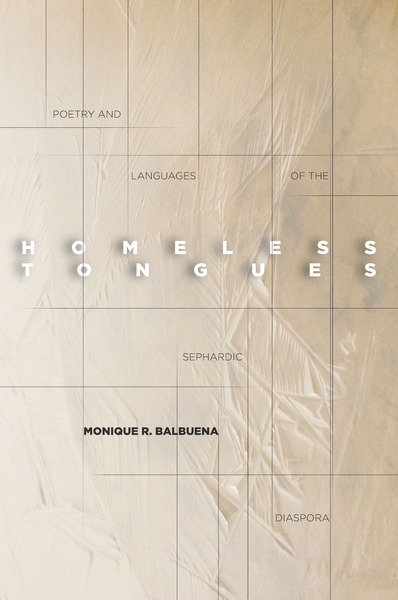Homeless Tongues: Poetry and Languages of the Sephardic Diaspora
by Monique R. Balbuena*
Stanford University Press, 2016 ISBN 978-0-8047-6011-9
Reviewed by Judith Roumani **
Poetry is the “art of intimacy”1 and among Sephardim poetry has, over the centuries, been the art that writers have most treasured and fostered. For those forced to be nomads, poetry is the most portable of the arts since it can be reduced to a few small pieces of paper tucked in among minimal possessions for the next leg of the journey. Even in Iberia, Sephardim would write in a different language from the local ones: most classical Sephardic poetry was written in Hebrew,2 while Arabic was reserved for prose. The famous jarchas attached to poems in other languages, but written in colloquial Romance dialects, presaged the development of the Peninsula languages and of Ladino/Judeo-Spanish. Thus bi- or multi-lingualism, with poetry written in an intimate language different from that of one’s surroundings, is virtually the norm for Sephardim.
When we think of Sephardic poetry, we usually think of traditional genres brought from Iberia: the evocative and fragmentary romances, coplas and so forth. Several volumes have anthologized such poetry, and its dignified, sorrowful measures have even embodied the agonies that Sephardim suffered during the Holocaust. This new work by Monique Balbuena is a study rather than an anthology, offering close readings of the work of three geographically isolated poets who employ “homeless tongues,” for the most part modern Sephardic poetry written in a language other than that of the poet’s milieu: Hebrew poetry written in French-speaking colonial Algeria by Sadia Levy, Hebrew and Ladino poetry written by Margalit Matitiahu in Israel, and Spanish and Ladino poetry written by Juan Gelman, in Argentina. These three poets examined in this book are by no means unusual: one can think of numerous other voices crying in the wilderness, such as the contemporary American Hebrew-language poet Robert Whitehill writing until recently in Maryland and now from California, the Ladino poet Haim Vitali Sadacca, writing from Canada, Florida, and Turkey, and Moshe Ha-Elion and Avner Perez, the Israeli translators of Homer from ancient Greek into modern Ladino/Judeo-Spanish. Publication on the internet helps greatly today with the problem of reaching one’s audience.
Without casting any doubt on the fluency of these poets in their chosen languages, I can say from personal experience and results (mercifully mislaid among moves to various countries) that one may not need to be fully fluent in all fields of a language in order to write poetry in it. Falling in love with the sound of the words, even their unfamiliarity and exoticism, can go a long way in this endeavor. Likewise, to read and understand poetry, one does not need to be aware of the precise meaning of every word, though naturally that deepens the experience. I think here of some poetry written in Italy: writing in the Pitiglianese dialect of Tuscany incorporating Jewish words, or the Jewish Bagitto dialect of Livorno, has even been practiced by non-Jewish local poets. Here the sound and the exoticism of the terms are most important.
Monique Babuena’s study offers us three poets enamored of a language that is not of their own “home,“ except in the deepest sense of a shared identity and longed-for intimacy. Her book provides a skillful, highly scholarly, and elegant addition to the growing body of work in modern Sephardic writing.
1
Term borrowed from the title of Jedrrilynn Dodds, Maria Rosa Menocal, and Abigail Krasner Balbale,
The Arts of Intimacy,: Christians, Jews and Muslims in the Making of Castilian Culture (New Haven: Yale University Press, 2008).
2
See e.g. Peter Cole, trans. and ed.,
The Dream of the Poem: Hebrew Poetry from Muslim and Christian Spain 950-1492 (Princeton: Princeton University Press, 2007).
* Monique Rodrigues Balbuena is Associate Professor of Comparative Literature and Jewish Studies at Clark Honors College, University of Oregon.
** Judith Roumani is the founder and editor of the peer-reviewed online journal, Sephardic Horizons, and author of a number of articles on Sephardic literature, as well as two book manuscripts, and a translator, most recently of the novel by Albert Memmi, The Desert.

